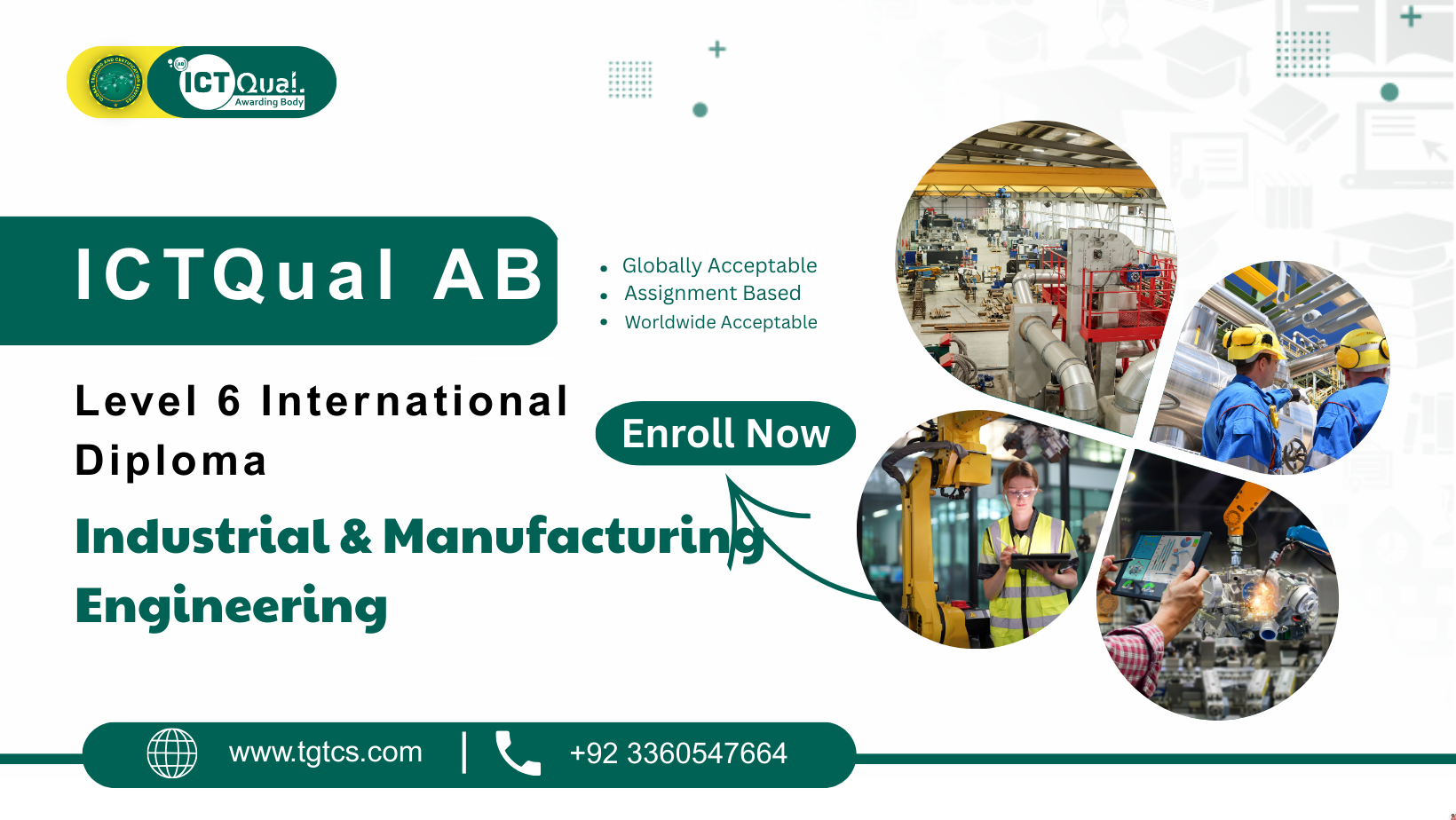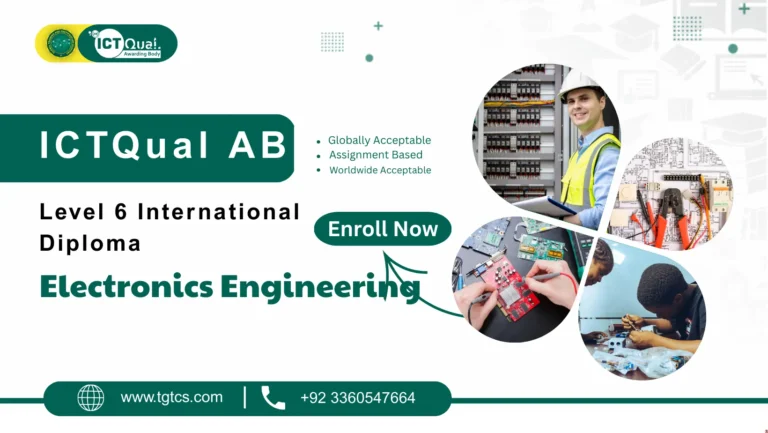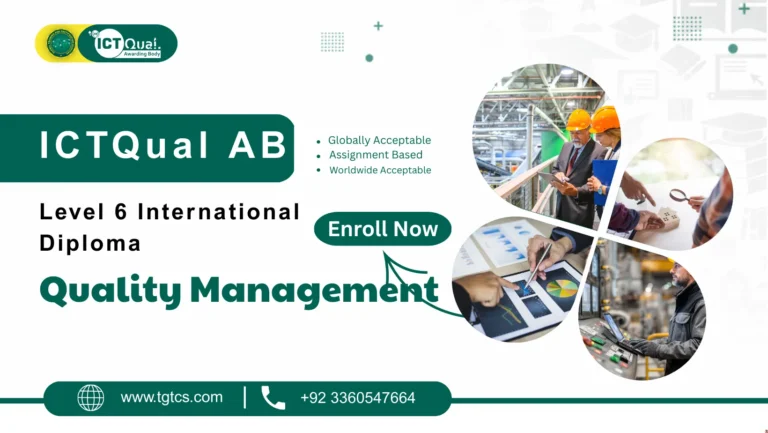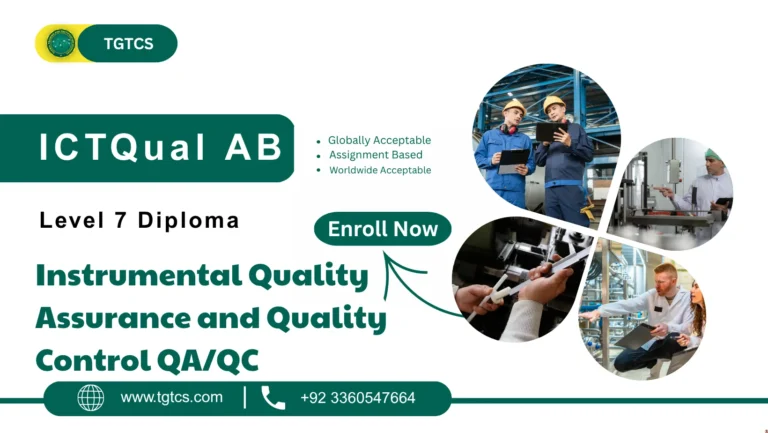ICTQual AB Level 6 International Diploma in Industrial and Manufacturing Engineering
The ICTQual AB Level 6 International Diploma in Industrial and Manufacturing Engineering is a globally recognized qualification designed to equip learners with advanced technical expertise and practical skills essential for modern industrial and manufacturing environments. In an era where industries are rapidly evolving through automation, smart manufacturing, and innovative production technologies, this diploma provides the knowledge and competencies required to lead complex manufacturing projects, optimize production processes, and drive operational excellence.
This comprehensive program covers all critical aspects of industrial and manufacturing engineering, including production planning, quality management, lean manufacturing, supply chain optimization, robotics, and industrial automation. Learners will gain a solid understanding of engineering principles, manufacturing systems, and production technologies, alongside practical skills in process improvement, cost analysis, and industrial safety. The diploma emphasizes hands-on applications, ensuring that graduates can implement innovative solutions, enhance productivity, and contribute effectively to industrial operations.
The ICTQual AB Level 6 International Diploma in Industrial and Manufacturing Engineering is fully assignment-based, allowing learners to study at their own pace from anywhere in the world. The program is British Council verifiable and MOFA and Embassy attested, making it ideal for career advancement, employment, and iqama approval in Gulf countries. By completing this diploma, learners develop critical thinking, problem-solving, project management, and leadership capabilities essential for roles such as industrial engineers, production managers, manufacturing consultants, and operations specialists.
This diploma is suitable for both fresh graduates and experienced professionals seeking to strengthen their expertise in industrial engineering and manufacturing. It provides a strategic pathway for global career opportunities in multinational corporations, research institutions, and advanced manufacturing sectors, preparing learners to meet the demands of the rapidly evolving industrial landscape.
The Global Training and Certification Services is Approved Training Centre of ICTQual AB UK Ltd
Course Level and Credits
The ICTQual AB Level 6 International Diploma in Industrial and Manufacturing Engineering is a 360-credit qualification designed to provide advanced knowledge and practical expertise in industrial processes, manufacturing systems, and operational management. The diploma is fully assignment-based, enabling learners to study at their own pace and from anywhere in the world, making it suitable for both fresh and experienced candidates.
Mode of Study
This diploma is fully assignment-based, allowing learners complete flexibility in managing their study schedules. Fresh learners must complete all 36 mandatory assignments within three years, while experienced professionals with at least six years of verifiable relevant experience can fast-track the diploma by demonstrating their knowledge in professional discussion meetings with an ICTQual AB approved assessor, bypassing the need to complete all assignments.
Global Recognition & Attestation
The certification is British Council verifiable, MOFA and Embassy attested, ensuring global recognition. It is ideal for career advancement, employment, and iqama approval in Gulf countries, making it a highly valuable qualification for professionals seeking international opportunities in the industrial and manufacturing sectors.
Eligibility and Flexibility
This qualification is suitable for both fresh learners and experienced professionals. Fresh students must complete all mandatory assignments within a three-year period to earn the diploma. Experienced and competent professionals can fast-track the process by submitting verifiable proof of at least six years of relevant experience and demonstrating their expertise in professional discussion meetings with an ICTQual AB approved assessor, allowing them to obtain the diploma in a shorter timeframe without completing all assignments.
Skills and Knowledge Gained
Learners develop expertise in production planning, quality management, industrial automation, lean manufacturing, robotics, and manufacturing system design. They also gain essential skills in problem-solving, decision-making, project management, and leadership, preparing them to implement innovative solutions and optimize complex industrial operations effectively.
Career Benefits
Graduates of this diploma are well-prepared for roles such as industrial engineers, production managers, manufacturing consultants, and operations specialists. The qualification opens pathways to employment in multinational corporations, advanced manufacturing industries, and research institutions, equipping learners with a globally recognized and verifiable credential for professional growth.
Mandatory Unit
This qualification, the ICTQual AB Level 6 International Diploma in Industrial & Manufacturing Engineering, consists of 36 mandatory units.
Year 1 – Foundation in Industrial & Manufacturing Engineering
- Principles of Industrial and Manufacturing Engineering
- Engineering Mathematics
- Fundamentals of Mechanical and Electrical Engineering
- Materials Science and Engineering
- Engineering Drawing and CAD
- Introduction to Manufacturing Processes
- Basics of Automation and Control Systems
- Production Planning and Operations Management
- Quality Fundamentals and Inspection Techniques
- Health, Safety, and Environmental Practices in Engineering
- Communication and Technical Report Writing
- Introduction to Project Management in Engineering
Year 2 – Intermediate Studies in Industrial & Manufacturing Engineering
- Manufacturing Systems and Technology
- Advanced Production Planning and Scheduling
- Lean Manufacturing and Continuous Improvement
- Industrial Automation and PLC Programming
- Supply Chain and Logistics Management
- Mechanical Design and Manufacturing Processes
- Industrial Maintenance and Reliability Engineering
- Computer-Aided Manufacturing (CAM)
- Data Acquisition and Process Monitoring
- Sustainable Manufacturing and Green Engineering
- Applied Research Methods in Engineering
- Human Factors and Ergonomics in Manufacturing
Year 3 – Advanced Studies in Industrial & Manufacturing Engineering
- Smart Manufacturing and Industry 4.0
- Advanced Manufacturing Technologies (Additive, CNC, etc.)
- Robotics and Autonomous Systems in Manufacturing
- Advanced Quality Management and Six Sigma
- Cyber-Physical Systems and IoT in Manufacturing
- Supply Chain Optimisation and Global Operations
- Advanced Process Engineering and Simulation
- Innovation and Product Development in Engineering
- Professional Ethics and Sustainability in Manufacturing
- Technology Entrepreneurship and Business Development
- Infrastructure and Facility Planning for Manufacturing Systems
- Final Year Major Project (Capstone Project)
The ICTQual AB Level 6 International Diploma in Industrial & Manufacturing Engineering equips learners with advanced technical knowledge, practical skills, and strategic expertise essential for modern industrial environments. Through comprehensive study across foundational, intermediate, and advanced units, learners develop critical problem-solving, analytical, and leadership capabilities required for successful careers in manufacturing and industrial engineering.
Year 1 – Foundation in Industrial & Manufacturing Engineering
Principles of Industrial and Manufacturing Engineering
- Understand the fundamental concepts and principles of industrial and manufacturing engineering.
- Apply engineering methodologies to solve basic manufacturing and production challenges.
- Identify core industrial processes and their role in production efficiency.
- Evaluate different types of manufacturing systems and their operational significance.
Engineering Mathematics
- Apply advanced mathematical techniques to solve engineering problems.
- Use statistical and analytical methods for quality and process control.
- Model engineering processes using mathematical formulas and calculations.
- Develop problem-solving skills relevant to industrial and manufacturing scenarios.
Fundamentals of Mechanical and Electrical Engineering
- Understand mechanical and electrical engineering principles applicable to manufacturing systems.
- Apply concepts of mechanics, circuits, and energy systems to industrial processes.
- Analyze mechanical and electrical systems for operational efficiency.
- Integrate mechanical and electrical knowledge in real-world manufacturing applications.
Materials Science and Engineering
- Examine the properties and selection of materials used in manufacturing.
- Evaluate material performance under different environmental and operational conditions.
- Apply material science principles to improve product quality and durability.
- Understand the impact of materials on sustainability and cost-effectiveness.
Engineering Drawing and CAD
- Develop technical drawing and CAD skills for designing manufacturing components.
- Interpret engineering diagrams and blueprints accurately.
- Utilize CAD software for modeling parts and assemblies.
- Apply visualization and design techniques for practical engineering solutions.
Introduction to Manufacturing Processes
- Identify various manufacturing techniques and process flows.
- Understand machining, casting, forming, and joining processes.
- Analyze process selection for efficiency and quality control.
- Apply knowledge to optimize manufacturing workflows.
Basics of Automation and Control Systems
- Understand fundamental automation principles and control system concepts.
- Apply basic programming for automated manufacturing systems.
- Integrate control systems in production processes for efficiency.
- Evaluate the role of automation in modern manufacturing environments.
Production Planning and Operations Management
- Develop operational strategies to optimize production.
- Apply scheduling, resource allocation, and workflow management techniques.
- Analyze production bottlenecks and propose improvement solutions.
- Implement operations management tools for effective industrial control.
Quality Fundamentals and Inspection Techniques
- Understand quality control principles and quality assurance standards.
- Apply inspection techniques and testing methods for products.
- Evaluate processes to maintain compliance with international standards.
- Use statistical tools for quality measurement and improvement.
Health, Safety, and Environmental Practices in Engineering
- Understand safety regulations and environmental standards in manufacturing.
- Apply risk assessment and hazard control techniques in industrial settings.
- Promote sustainability and eco-friendly practices in engineering processes.
- Ensure compliance with occupational health and safety policies.
Communication and Technical Report Writing
- Develop professional technical writing and reporting skills.
- Communicate engineering concepts effectively in written form.
- Prepare detailed project documentation and reports for stakeholders.
- Enhance clarity and accuracy in technical presentations.
Introduction to Project Management in Engineering
- Understand project management principles applicable to engineering projects.
- Apply planning, scheduling, and monitoring techniques.
- Manage project resources and timelines efficiently.
- Evaluate project risks and implement mitigation strategies.
Year 2 – Intermediate Studies in Industrial & Manufacturing Engineering
Manufacturing Systems and Technology
- Analyze various manufacturing systems, including batch, continuous, and flexible systems.
- Understand the integration of modern technologies in industrial production.
- Evaluate system efficiency and workflow optimization strategies.
- Apply knowledge to enhance productivity and reduce operational costs.
Advanced Production Planning and Scheduling
- Develop detailed production schedules aligned with organizational goals.
- Implement resource allocation strategies for maximum efficiency.
- Use planning tools and software for scheduling and process management.
- Monitor production progress and adjust plans to meet deadlines and quality standards.
Lean Manufacturing and Continuous Improvement
- Apply lean principles to eliminate waste in manufacturing processes.
- Identify opportunities for continuous process improvement.
- Implement Kaizen, 5S, and other lean methodologies.
- Enhance operational efficiency while maintaining high-quality standards.
Industrial Automation and PLC Programming
- Design and program PLC-based control systems for automated processes.
- Integrate automation technologies to improve production accuracy and speed.
- Troubleshoot automated systems and optimize operational performance.
- Understand the role of robotics and embedded systems in modern manufacturing.
Supply Chain and Logistics Management
- Analyze end-to-end supply chain processes for efficiency and cost reduction.
- Apply logistics and inventory management principles to optimize operations.
- Evaluate supplier performance and procurement strategies.
- Understand global supply chain challenges and implement solutions.
Mechanical Design and Manufacturing Processes
- Develop advanced mechanical design skills for manufacturing applications.
- Apply design for manufacturability and assembly principles.
- Analyze mechanical systems to improve efficiency and durability.
- Integrate design and process engineering for optimized production.
Industrial Maintenance and Reliability Engineering
- Implement preventive and predictive maintenance strategies.
- Analyze system reliability and operational risks.
- Optimize maintenance schedules to reduce downtime.
- Apply reliability engineering principles to enhance production continuity.
Computer-Aided Manufacturing (CAM)
- Use CAM software for process simulation and product manufacturing.
- Integrate CAD designs with CAM systems for seamless production.
- Optimize machining operations using automated tools.
- Apply digital manufacturing solutions to increase accuracy and efficiency.
Data Acquisition and Process Monitoring
- Implement sensor systems for monitoring production parameters.
- Collect and analyze data to optimize manufacturing processes.
- Use statistical tools for quality improvement and operational control.
- Integrate data-driven insights into strategic decision-making.
Sustainable Manufacturing and Green Engineering
- Apply principles of sustainable and eco-friendly manufacturing.
- Evaluate environmental impacts of production processes.
- Implement green technologies to reduce waste and energy consumption.
- Promote sustainability practices across industrial operations.
Applied Research Methods in Engineering
- Conduct research to identify industrial process improvements.
- Apply quantitative and qualitative research techniques.
- Analyze engineering data to support innovation and decision-making.
- Document research findings for professional and academic purposes.
Human Factors and Ergonomics in Manufacturing
- Analyze workplace design to optimize safety and productivity.
- Apply ergonomics principles to reduce operator fatigue and injuries.
- Evaluate human-machine interactions for process improvement.
- Promote workforce efficiency through effective ergonomics design.
Year 3 – Advanced Studies in Industrial & Manufacturing Engineering
Smart Manufacturing and Industry 4.0
- Integrate Industry 4.0 technologies into manufacturing systems.
- Apply IoT, AI, and machine learning for intelligent production.
- Optimize real-time monitoring and decision-making processes.
- Evaluate smart manufacturing strategies for industrial competitiveness.
Advanced Manufacturing Technologies (Additive, CNC, etc.)
- Utilize advanced manufacturing techniques including 3D printing and CNC machining.
- Analyze production capabilities and limitations of modern manufacturing tools.
- Implement precision manufacturing for complex components.
- Innovate processes using advanced technology applications.
Robotics and Autonomous Systems in Manufacturing
- Design and program robotic systems for automated production.
- Integrate autonomous machines into manufacturing workflows.
- Evaluate robotic applications for efficiency and safety improvements.
- Apply robotic systems to optimize high-volume and precision operations.
Advanced Quality Management and Six Sigma
- Implement Six Sigma methodologies for process improvement.
- Use statistical quality control to enhance production consistency.
- Develop quality management systems aligned with industry standards.
- Promote continuous quality improvement across manufacturing operations.
Cyber-Physical Systems and IoT in Manufacturing
- Integrate cyber-physical systems to enable smart factory operations.
- Monitor and control processes through connected IoT devices.
- Analyze data from interconnected systems for predictive maintenance.
- Apply IoT solutions to improve efficiency, safety, and productivity.
Supply Chain Optimisation and Global Operations
- Analyze and optimize global supply chains for cost and time efficiency.
- Apply strategic sourcing and procurement best practices.
- Evaluate international logistics challenges and implement solutions.
- Integrate production and supply chain strategies for operational excellence.
Advanced Process Engineering and Simulation
- Model and simulate industrial processes for optimization.
- Apply process engineering principles to improve efficiency and throughput.
- Evaluate production systems using simulation tools for performance analysis.
- Implement changes based on simulation results to enhance operations.
Innovation and Product Development in Engineering
- Develop innovative solutions for manufacturing challenges.
- Apply product development methodologies from concept to launch.
- Integrate design thinking and engineering principles for new products.
- Foster creativity and innovation within industrial projects.
Professional Ethics and Sustainability in Manufacturing
- Promote ethical practices and corporate responsibility in engineering.
- Evaluate sustainability challenges in industrial and manufacturing processes.
- Implement eco-friendly strategies across production systems.
- Ensure compliance with international standards and regulations.
Technology Entrepreneurship and Business Development
- Develop business strategies for manufacturing technology ventures.
- Apply entrepreneurial principles in industrial settings.
- Identify market opportunities for innovative manufacturing solutions.
- Integrate technology, engineering, and business skills for commercial success.
Infrastructure and Facility Planning for Manufacturing Systems
- Design efficient layouts for industrial facilities.
- Optimize resource allocation and workflow for operational efficiency.
- Implement safety and compliance measures in facility planning.
- Plan scalable infrastructure for future production growth.
Final Year Major Project (Capstone Project)
- Execute a comprehensive project integrating knowledge from all units.
- Apply research, analysis, and engineering skills to solve real-world problems.
- Develop project management, documentation, and presentation skills.
- Demonstrate innovation, problem-solving, and technical expertise in a professional setting.
By the end of this qualification, learners will be proficient in smart manufacturing, advanced production technologies, robotics, process optimization, and sustainable engineering practices. They will possess the expertise to lead projects, implement innovative solutions, and contribute effectively to the growth and efficiency of industrial and manufacturing organizations globally.
The ICTQual AB Level 6 International Diploma in Industrial and Manufacturing Engineering equips learners with advanced knowledge and practical skills essential for success in modern industrial and manufacturing environments.
Technical Expertise
- Gain in-depth knowledge of industrial engineering principles, manufacturing processes, and advanced production technologies.
- Develop practical skills in smart manufacturing, robotics, automation, process optimization, and supply chain management.
Leadership and Management Skills
- Master project management, quality control, and sustainable manufacturing practices to enhance operational efficiency.
- Acquire strategic leadership, problem-solving, and decision-making skills essential for managerial roles in industrial organizations.
Global Recognition
- Strengthen professional credibility with a globally recognized qualification, verifiable by the British Council and attested by MOFA and Embassies.
- Boost employability for roles in multinational corporations, advanced manufacturing units, and research institutions worldwide.
Career Advancement
- Prepare for roles as industrial engineers, manufacturing managers, process optimization specialists, production planners, and technology leaders.
- Gain a qualification that enhances career prospects, supports professional growth, and facilitates iqama approval in Gulf countries.
This diploma empowers learners to drive innovation, improve productivity, and implement sustainable practices in industrial and manufacturing sectors, making it a highly valuable qualification for global career advancement.
The ICTQual AB Level 6 International Diploma in Industrial and Manufacturing Engineering is designed for a wide range of learners aiming to advance their careers in industrial and manufacturing sectors.
Aspiring Industrial Engineers
- Seek to gain comprehensive knowledge of industrial and manufacturing processes.
- Aim to develop practical skills in production planning, automation, and process optimization.
Experienced Manufacturing Professionals
- Want to enhance leadership, project management, and operational efficiency skills.
- Intend to gain globally recognized certification to support career progression.
Entrepreneurs and Business Leaders
- Plan to establish or manage manufacturing enterprises efficiently.
- Seek strategic insights into supply chain management, lean manufacturing, and advanced technologies.
Students and Graduates in Engineering Fields
- Wish to build a strong foundation in industrial engineering and manufacturing principles.
- Aim to acquire hands-on skills applicable to real-world industrial and production environments.
Global Professionals Seeking Career Advancement
- Want a qualification that is British Council verifiable, MOFA and Embassy attested.
- Intend to improve employability, iqama approval, and professional credibility internationally.
This diploma is ideal for learners at any stage who want to develop technical expertise, leadership skills, and global recognition in industrial and manufacturing engineering.
Course Overview
Course Level
Level 6
Course Units
36 Units
Credits
360
Duration
3 years






